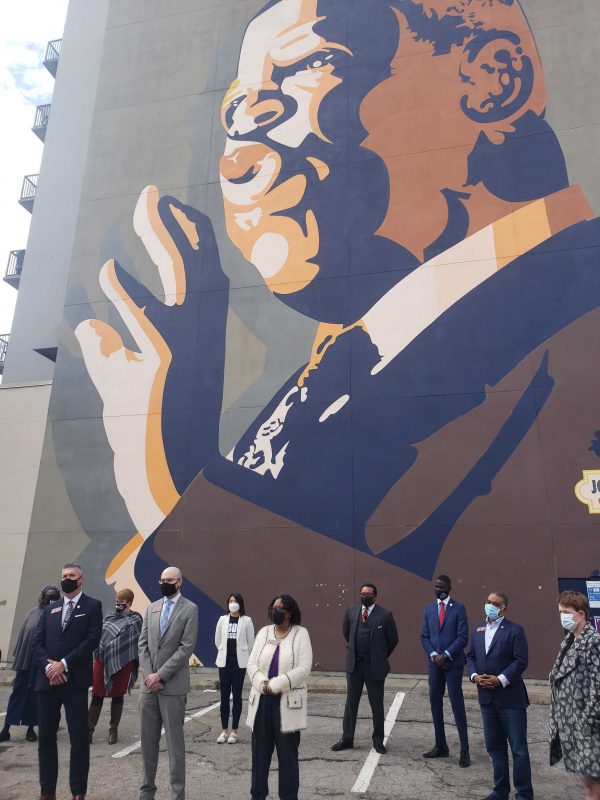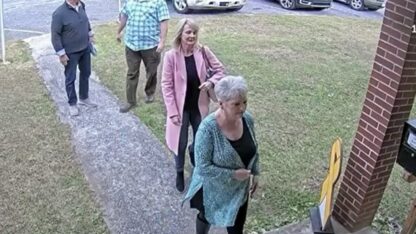State House Democrats Announce Bill That Would Restore Voting Rights To Georgians Convicted Of A Felony

Democratic state lawmakers and community leaders announce a new felony re-enfranchisement bill underneath a mural of John Lewis, the late civil rights leader and congressman from Atlanta.
Christopher Alston / WABE
This coverage is made possible through Votebeat, a nonpartisan reporting project covering local election integrity and voting access. The article is available for reprint under the terms of Votebeat’s republishing policy.
A group of Georgia House Democrats has announced a constitutional amendment that would restore voting rights for Georgians convicted of a felony.
The bill was sponsored by Rep. Josh McLaurin, D-Sandy Springs, who made the announcement at a press conference Wednesday in front of a mural depicting John Lewis, the late congressman and civil rights leader.
“Standing under this mural of this celebrated hero,” McLaurin said, “we will not compromise our fundamental view that this is about ending a racist policy designed to systematically exclude Black people and others from our democracy.”
McLaurin was joined at the press conference by several Democratic representatives and leaders of the Georgia NAACP, New Georgia Project and other civil rights organizations.

“So on this last day of the Trump administration, this important legislation is critical to undoing the work of the white supremacy regime that narrowed the gains following the Civil War and that great Reconstruction,” said Francys Johnson, chairman of the New Georgia Project and a civil rights lawyer.
Anyone convicted of a felony in Georgia is prevented from voting until they fully complete any sentence of probation or parole, which frequently takes years after being released from incarceration. The law is applied to all felony convictions despite the actual wording of the law being “felonies involving moral turpitude,” because the law fails to define moral turpitude.
This is especially significant in Georgia, where there are more people on probation than in any other state, according to the most recent data from the Bureau of Justice Statistics.
According to the Sentencing Project, an estimated 275,000 Georgians, the majority Black, were unable to vote in 2020 due to felony convictions.
“And Georgia is one of the most restrictive states. Those who have completed their sentences, but remain under carceral control, through parole or probation, or those who owe fees, are restricted from exercising one of the most fundamental rights,” said Rep. Bee Nguyen, D-Atlanta, a co-sponsor of the bill.
Ahead of the November presidential election, the Georgia secretary of state’s office clarified that those in legal debt – voters with unpaid court fines, fees or restitution – are still eligible to vote if they have completed the rest of their sentence.
“These are now working, tax-paying citizens, but as the law currently sits, they are excluded from the voting process, which is a modern-day and clear example of ‘taxation without representation,’” said Rep. Gregg Kennard, D-Lawrenceville, who also spoke at the press conference.
No Taxation Without Representation is also the name of a campaign aimed at ending felony disenfranchisement, organized by the Inner-City Muslim Action Network Atlanta. The campaign’s founder, Tariq Baiyina, led an initiative to register eligible voters who have completed felony sentences before he was arrested in July. The campaign has continued to register voters.
The constitutional amendment is likely to face tough opposition from the Republican majority, as a similar measure was shot down along party lines by a Georgia Senate study committee in late 2019.
Jake Evans, chair of the Election Competence Task Force of the Georgia Republican Party, said felony disenfranchisement laws have been constitutionally upheld for those incarcerated and those under community supervision.
“The logic behind it is that if you commit crimes, you lose certain abilities,” Evans said. “It provides an incentive system for individuals to, No. 1, not commit crimes, and No. 2, to act properly and appropriately to do their time, and once their time has been done, they have the ability to get their voting rights back.”
“I think we have to be very careful to maintain that incentive structure to encourage people to act appropriately,” Evans said.
Felony voting laws are also likely to face opposition from Gov. Brian Kemp, who has not pursued the bipartisan criminal justice reform platform of his predecessor, Republican Nathan Deal.








